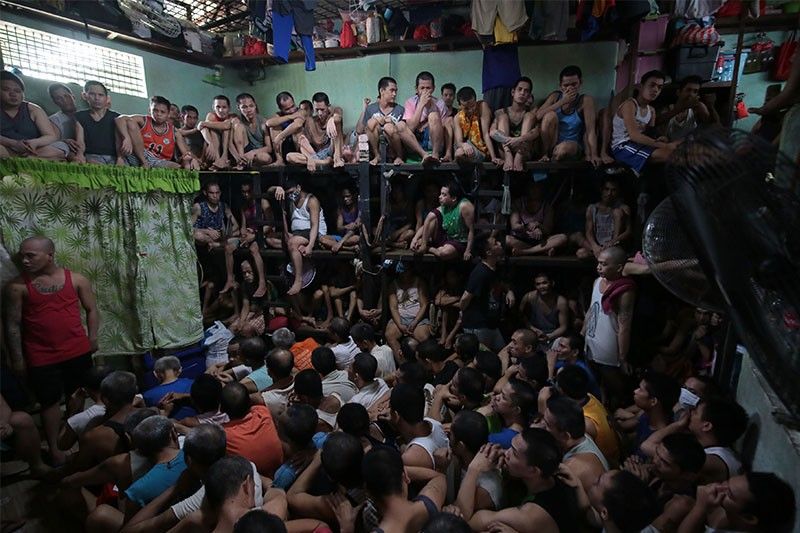Conditions in several Philippine jails, detention facilities 'cruel, inhuman' — CHR

MANILA, Philippines — The Commission on Human Rights on Friday slammed the inhuman conditions in overcrowded Philippine jails.
The commission pointed out that several jails and detention centers in the country hold a number of prisoners over five times their intended capacity.
"Overcrowded jail cells and detention facilities [are] akin to cruel, degrading, inhuman treatment or punishment. [They increase] the likelihood of transmission of [COVID-19] which places the lives of the old and immunocompromised inmates in peril," the commission's spokesperson Jacqueline de Guia said in a statement.
The CHR further explained that these conditions fall "short of meeting the United Nations Standard Minimum Rules for the Treatment of Prisoners as well as the [Bureau of Jail and Management Penology's] Manual on Habitat, Water, Sanitation and Kitchen in Jails."
The Philippines has an Anti-Torture Law which prohibits torture and other forms of ill-treatment against Persons Deprived of Liberty (PDLs).
Despite this, the CHR said "reports of torture and abuse of detainees and persons accused still persist."
Drug detention and rehabilitation centers
Figures released by the BJMP in May showed that 70.58% of inmates in its facilities, 96,620 detainees, are facing drug charges.
This percentage is in large part due to the crackdown on illegal drugs launched by President Rodrigo Duterte when he took office in 2016.
Several United Nations (UN) entities on June 1 highlighted the "sub-standard" living conditions in drug detention and rehabilitation centers which leave PDLs vulnerable both to disease and to abuse.
In addition to overcrowding and other hurdles to maintaining physical distancing in prisons, the UN said “forced labor, lack of adequate nutrition, physical and sexual violence, and denial or comparatively lower access to and quality of healthcare services” were other factors contributing to the higher vulnerability of detainees.
"Among the groups particularly at risk of contracting [COVID-19] are people in compulsory drug detention and rehabilitation centers. They are often comprised of people who are suspected of using drugs or being dependent on drugs, people who have engaged in sex work, or children who have been victims of sexual exploitation,” UN agencies earlier said in a joint statement.
The organization further urged member states in Asia and the Pacific to "permanently close compulsory drug detention and rehabilitation centers” in order to curb the spread of COVID-19.
Latest data from the BJMP shows that 745 detainees have contracted the deadly coronavirus.
The anti-terrorism bill
De Guia on Friday praised the Supreme Court's effort to fast-track "decongestion efforts for the compassionate and temporary release of qualified PDLs."
However, she warned that the controversial anti-terror bill, if turned into law, would further aggravate the sub-human conditions in Philippine jails and detention centers.
"Provisions in the Act that allow arrest of individuals without judicial warrant and prolonged period of detention without charges may endanger the rights of the accused to due process and make them vulnerable to cruel, degrading, and inhumane treatment. We reiterate call for the amendment of these provisions that are prone to abuse," De Guia said.
The bill has been widely criticized for its vague definition of terrorism which many fear will lead to abuse on the executive branch's part. The bill also allows terrorism suspects to be held for 24 days before they must be presented before a judicial authority.
The Integrated Bar of the Philippines has said that designating judicial powers to the Anti-Terrorism Council under the proposed Anti-Terrorism Act of 2020 violates the Constitution and the principles of checks and balances. — with reports from Kristine Joy Patag
- Latest
- Trending
































